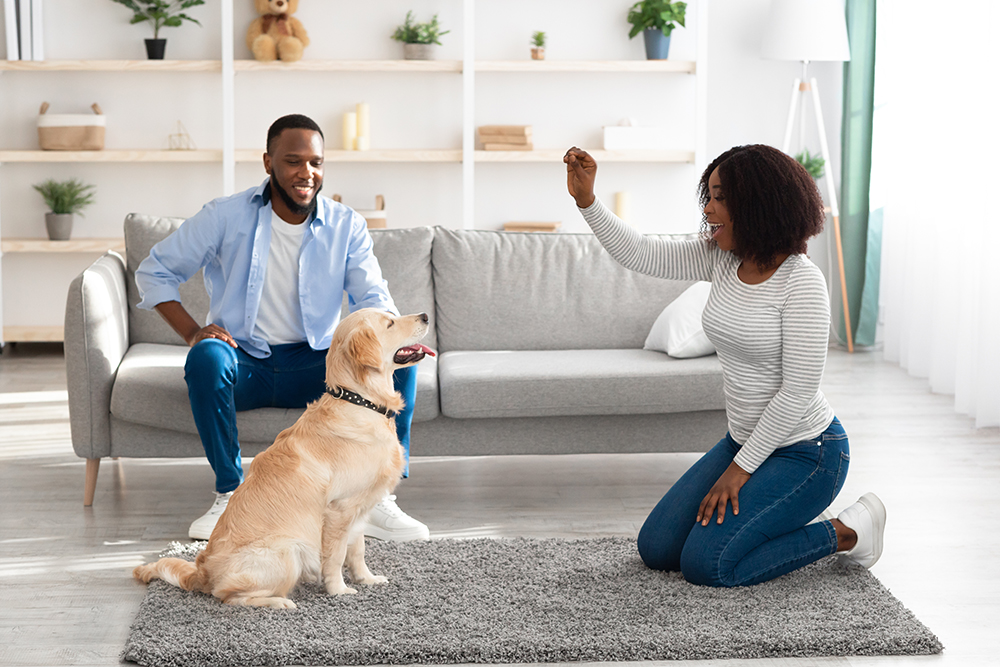Spending time outdoors for fresh air, exercise and mental stimulation is vital to your dog’s happiness and well being.
“Who wants to go out?” It’s a question that usually elicits an enthusiastic response from your pooch, complete with furiously wagging tail and lots of excited barking. The reason? Most dogs just love to go out! In fact, they actually need time outdoors for their physical and mental well being.
1. Daily outdoor time provides exercise and helps with weight control
Dogs that spend most of their days inside can easily gain weight because they spend a lot of time lying around dozing, often out of boredom. Obesity is as dangerous for dogs as it is for people, and can lead to a host of health problems. Regular exercise outdoors helps maintain a healthy body weight and keep the dog in good condition. Some breeds, in fact, such as border collies, huskies, beagles and other working or sporting dogs, need plenty of outdoor activity in order to stay happy and well-adjusted.
2. Regular time outside gives your dog exposure to fresh air
Depending on where you live, outdoor air quality is generally better than indoor air quality – except on hot, humid days when smog might be an issue. Otherwise, unless you live a green lifestyle and use mostly natural materials and cleaners in your home, you and your dog may be exposed to a host of indoor air toxins, ranging from household cleaners to the chemicals that off-gas from plastics, carpets, upholstery and so on. Letting your dog spend a good chunk of time outdoors every day helps reduce the amount of time he’s exposed to these toxins.
3. Being outdoors helps reduce boredom, anxiety and depression
If dogs don’t receive daily doses of outside stimulation, they can get restless and develop behavioral problems and aggressive tendencies. “If we don’t keep their minds occupied or give them opportunities to release their physical energy, dogs will release that energy in other ways,” warns animal behaviorist Dr. Suzanne Hetts. “You might look for signs the dog is bored or doesn’t have enough to do. Maybe he’s putting on weight because he’s not getting enough exercise. Maybe he’s showing other signs of stress or becoming anxious in other environments because he’s not exposed enough to different situations.”
4. Sunlight is a valuable source of natural vitamin D for your dog
Spending time outdoors in the sun will give your dog an extra boost of this valuable vitamin, which is vital for bone health and helps maintain the correct calcium to phosphorus ratio in the body. While lying near a sunny window can help with this, the glass absorbs some of the sun’s radiation, so it’s not as good as being outdoors. Just remember there’s also such a thing as too much sun, especially if your dog is light-colored and/or has a pink nose or a thin coat. Skin cancer can be an issue in dogs.
5. Coming into direct contact with the earth is important to your dog’s health and happiness
Everyone knows that dogs love rolling in grass or digging in dirt, but why exactly do they do it? One theory is that they are instinctively seeking out the earth’s magnetism. Being indoors cuts us and our dogs off from this natural magnetism, which plays an underestimated role in our health and well being, while exposing us to manmade forms of electromagnetism that interfere with the earth’s magnetic current and may cause us to feel rundown, low on energy and stressed out. Letting your dog walk and roll on the earth can help rejuvenate him.
But I don’t have time!
When the weather allows, get your dog outside as much as possible, whether it’s for a walk, a game of fetch or just to roam around the yard or lie in the sun for a couple of hours. Ideally, you should stay with him when he’s in the yard, but if you’re like most people you probably don’t have hours to spend outside with your dog every day. If he likes being outdoors for long periods when you have other things to do, you need to provide a safe environment for him.
Yard safety
The first rule is to never let your dog run free. Make sure he is securely contained in an exercise pen or a Fort Knox-type fenced-in yard. An ideal yard should contain a six-foot fence and a locked gate.
• Individual dogs vary as to how long they want to, or should, stay outside. According to Dr. Hetts, factors to consider include the weather, your dog’s age and breed, and whether or not he really likes to be outside for long periods. “Some toy breeds are a little fragile or may not have much hair, like the Chinese crested,” she says. “Very young puppies can’t thermal-regulate their body temperature.” Elderly dogs also shouldn’t be left out for long periods.
• Do not tether your dog on a long lead then leave him alone – it could get wound around a tree or other obstacle and causing choking or other injury.
• Always make sure he has adequate shelter from heat and cold, an endless supply of fresh, clean water, and a few toys to play with.
• Ensure the weather is nice enough for your dog to stay out! If it’s very cold, raining or extremely hot and humid, do not leave him out for long periods.
• Dr. Hetts advises against leaving food outside because it can attract strays and wild animals.
• Clear the yard of potential hazards such as sharp edges, toxic or thorny plants, wasp nests, stagnant water, etc. Dr. Hetts warns that uncovered lawn edging can be a danger. “Dogs might also be exposed to bee stings. Or they can chew or ingest things they shouldn’t and perhaps get a foreign body stuck in their intestines.”
• Make sure your dog is microchipped and has an up-to-date ID tag with two current phone numbers.
• Animal theft is a growing crime. Ensure all fencing and gates are secure and locked.
• Check on your dog often when he’s outside on his own.
It’s not a good idea to leave your dog outside when you’re away. If you have to, give him the option of being able to get in and out of the house via a doggy door. This is especially useful if the weather suddenly changes while you’re away. “Toni dug her way out from under the fence in a storm because she was so scared of the thunder,” says Noreen. “I was at work when the storm hit, and came home to an empty yard. It took us a couple of hours to find Toni. My parents finally found her trotting along a busy highway about a mile away, wet and disoriented.”
A better alternative to leaving your dog out when you’re away is to hire a pet sitter or ask a friend or family member to come by a couple times a day to take him for a walk or into the yard for half an hour. And try to spend some outdoor time with him yourself when you get home and on weekends. It will benefit him both physically and mentally, help him gain healthy social skills, and develop a stronger bond with you.
Taking your dog outdoors helps reduce boredom, anxiety and strengthens your bond. Don’t believe us? Give it a try!








